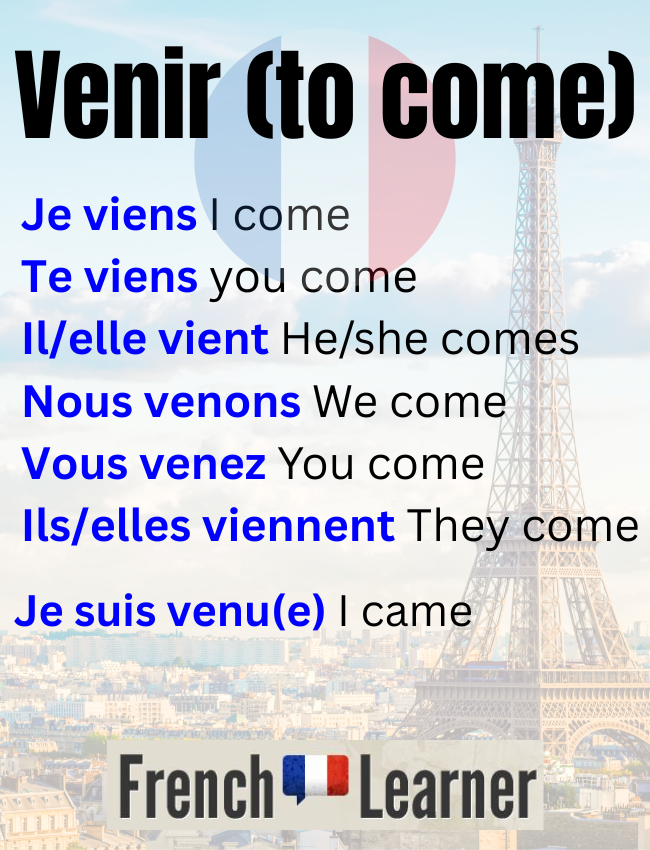How to conjugate venir (to come) in French

Venir means “to come” and is one of the most commonly used verbs in the French language. The conjugation of venir in the present tense is: je viens (I come), tu viens (you come), il/elle vient (he, she comes), nous venons (we come), vous venez (you come, plural and formal) and ils/elles viennent (they come).
Venir is an irregular verb. This means that it has different endings than other regular ir verbs when conjugated in the present tense.
In in addition, in the passé composé (a commonly used French tense), venir uses être as an auxiliary (helping) verb.
Common uses of venir
The most common use of venir is simply to state where once is coming from. For example:
- Je viens de France. I’m from France.
- Il vient de Londres. He’s from London.
The second most common usage of venir is to express “to just + verb”. The grammatical construction is venir de + infinitive. For example:
- Je viens de manger. I just ate.
- Elle vient de finir son travail. She just finished her work.
The construction venir à + infinitive means to end up, to come or to eventually do something. For example:
- S’il vient à faire plus doux, on ne pourra plus faire du ski. If the weather ends up warming more, we won’t be able to ski anymore.
Venir conjugation table – quick glance
The follow table provides a quick glance at how to conjugate the French verb venir (to come) in six major tenses.

Venir conjugation tables – with example sentences
In the following section we’ll look at the verb venir in all six major tenses with example sentences.
Present tense
In the French present tense, je viens can translate to both “I come” and “I am coming”.
| Je viens | I come | Je viens de Paris. | I am from Paris. |
| Tu viens | You come (singular informal) | Tu viens de Londres | You are from London. |
| Il/elle vient | He/she comes | Elle vient de France. | She is from France. |
| Nous venons | We come | Nous venons de la plage. | We are coming from the beach. |
| Vous venez | You come (formal, plural) | Vous venez du magasin. | You are coming from the store. |
| Ils/elles viennent | They come | Ils viennent de Montréal. | They are from Montreal. |

Passé composé
The following table provides the conjugation of venir in the passé composé with example sentences.
| Je suis venu(e) | I came | Je suis venu hier. | I came yesterday. |
| Tu es venu(e) | You came (informal singular) | Tu es venu avec Marc. | You came with Marc. |
| Il/elle est venu(e) | He/she came | Il est venu tout seul. | He came alone. |
| Nous sommes venu(e)s. | We came | Nous sommes venu en janiver. | We came in January. |
| Vous êtes venu(e)(s) | You came (formal, plural) | Vous êtes venus pour la première fois. | You came for the the first time. |
| Ils/elles sont venu(e)s | They came | Ils sont venus pour faire du ski. | They came to ski. |
Imperfect
The following table provides conjugation of venir in the imperfect tense. This page on our site covers the imperfect tense in detail.
| Je venais | I was coming/used to come | Je venais une fois par semaine. | I used to come once weekly. |
| Tu venais | You were coming/used to come (informal singular) | Tu venais avant Julie. | You used to come before Julie. |
| Il/elle venait | He/she was coming/used to come | Elle venait de la plage. | She was coming from the beach. |
| Nous venions | We were coming/used to come | Nous venions chaque année. | We used to come every year. |
| Vous veniez | You were coming/used to come (formal, plural) | Vous veniez d'y aller souvent. | You used to go often. |
| Ils/elles venaient | They were coming/used to come | Ils venaient un peu plus ouvent. | They used to come a bit more often. |
Future tense
The following table is of venir in the futur simple tense. This page on our site covers the two main French future tenses.
| Je viendrai | I will come | Je viendrai demain. | I will come tomorrow. |
| Tu viendras | You will come (singular informal) | Tu viendras en mars. | You will come in March. |
| Il/elle viendra | He/she will come | Elle viendra avec Martin. | She will come with Martin. |
| Nous viendrons | We will come | Nous viendrons en hiver. | We will come in the winter. |
| Vous viendrez | You will come (plural, formal) | Vous viendrez en avril. | You will come in April. |
| Ils/elles viendront | They will come | Ils viendront avec la famille. | They will come with the family. |

Conditional tense
The following table covers venir in the conditional our “would” tense. This page on our site covers the conditional tense in detail.
| Je viendrais | I would come | Je viendrais mais je suis occupé. | I would come but I'm busy. |
| Tu viendrais | You would come (informal singular) | Tu viendrais si tu avais le temps. | You would come if you had the time. |
| Il/elle viendrait | He/she would come | Elle viendrait mais ce n'est pas possible. | She would come but it's not possible. |
| Nous viendrions | We would come | Nous vendrions mais c'est trop loin. | We would come but it's too far. |
| Vous viendriez | You would come (formal plural) | You viendriez mais vous devez travailler. | You would come but you have to work. |
| Ils/elles viendraient | They would come | Ils viendraient mais ils n'ont pas de voiture. | They would come but they don't have a car. |
Subjunctive mood
The following table covers venir in the subjunctive mood. This page on our site covers the French subjunctive in detail.
| que je vienne | that I come | Il faut que je vienne. | I have to come. |
| que tu viennes | that you come (singular infomral) | Je veux que tu viennes. | I want you to come. |
| qu'il/elle vienne | that he/she comes | Je doute qu'il vienne. | I doubt he's coming. |
| que nous venions | that we come | Ils sont heureux que nous venions. | They're happy we're coming. |
| que vous veniez | that you come (formal, plural) | Il faut que vous veniez. | You have to come. |
| qu'ils/elles viennent | that they come | Je ne sais pas s'ils viennent. | I don't know if they're coming. |
Conclusion: Venir – video lesson
The following video from Alexa explains how to conjugate venir in five main tenses.
Discover more:
- être (to be) conjugation tables
- avoir (to have) conjugation tables
- aller (to go) conjugation tables
- faire (to make, do) conjugation tables




